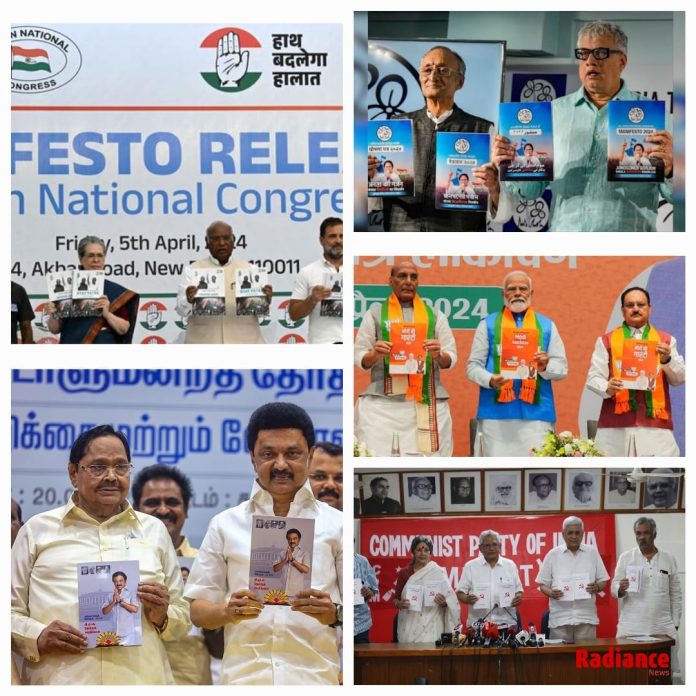21 April 2024
As India gears up for the Lok Sabha elections, the manifestos released by prominent political parties outline ambitious agendas for legislative and judicial reforms. The Bharatiya Janata Party (BJP), Indian National Congress, Communist Party of India (Marxist) (CPI(M)), Dravida Munnetra Kazhagam (DMK), and Trinamool Congress (TMC) have all articulated their visions for legal and governance reforms aimed at addressing societal challenges and enhancing justice systems. This comprehensive analysis delves into the key promises made by each party, highlighting their proposed changes in civil and commercial justice systems, commitments to social equality, tax reforms, and approaches to issues like farmer welfare, LGBTQIA+ rights, and educational reform. These manifestos not only reflect the parties’ electoral strategies but also provide insights into their plans for shaping India’s legislative and judicial landscapes.
Key points from the manifestos of the major political parties – BJP, Congress, CPI(M), DMK, and TMC – in terms of legislative and judicial reforms are as follows:
Bharatiya Janata Party (BJP):
- Overhaul of Civil and Commercial Justice Systems:
– Intend to revamp legal procedures to enhance efficiency, similar to upcoming criminal justice reforms.
- Uniform Civil Code (UCC):
– Commitment to implementing a UCC to safeguard women’s rights and ensure uniformity in personal laws.
- Reservations for Women in Parliament and State Legislatures:
– Pledge to systematically implement reservations for women as per the 128th constitutional amendment.
- Strengthening Real Estate Regulatory Authority Act:
– Aim to make the real estate sector more transparent and citizen-friendly.
- Increase in Minimum Support Prices (MSP):
– Promise an unprecedented rise in MSP for major crops, with periodic increases.
- National Litigation Policy:
– Plan to formulate a policy for quicker resolution of legal cases at lower costs, reducing government litigation burden.
- Digitization of Court Records:
– Accelerate the e-Courts Mission Mode Project for complete digitization of court records.
- Phased Removal of Armed Forces (Special Powers) Act (AFSPA):
– Intend to phase out AFSPA in disturbed areas based on a planned approach.
- Legal Standards for Cultural Intellectual Property:
– Collaborate with international organizations to protect cultural intellectual property.
Indian National Congress:
- Reservations in Private Educational Institutions:
– Commitment to providing reservations for SCs, STs, and OBCs in private educational institutions.
- Rohith Vemula Act:
– Proposed legislation to combat discrimination faced by oppressed communities in educational institutions.
- Free Education from Class I to XII in Public Schools:
– Promise of compulsory and free education in public schools up to Class XII.
- Recognition of Civil Unions for LGBTQIA+ Couples:
– Advocacy for civil unions to recognize the rights of LGBTQIA+ individuals.
- Minimum Support Prices (MSP) for Farmers:
– Assurance of announcing MSPs annually in line with Swaminathan Commission recommendations.
- Social Security for Unorganized Sector Workers:
– Pledge to enhance rights and social security for workers in the unorganized sector.
- Reforms in Personal Laws:
– Commitment to encouraging reforms in personal laws with community participation.
- Restoring Full Statehood to Jammu and Kashmir:
– Promise to restore the statehood status of Jammu and Kashmir.
- Tax Reforms:
– Proposal for transparent and clear tax administration through a new Direct Taxes Code.
Communist Party of India (Marxist) (CPI(M)):
- Repeal of “Draconian” Laws:
– Vow to repeal laws like the Citizenship Amendment Act (CAA), UAPA, NSA, and AFSPA.
- Tax on Super-Rich:
– Proposal for a tax on the super-rich, including wealth and inheritance taxes.
- Statutory Minimum Wage:
– Plan to introduce a statutory minimum wage of at least Rs. 26,000 per month.
- Employment Guarantee in Urban Areas:
– Commitment to ensuring employment guarantee in urban areas.
- Reservations in Private Sector Jobs and Educational Institutions:
– Advocacy for reservations for SCs, STs, and OBCs in private sector jobs and education.
- Restoring Full Statehood to Jammu and Kashmir:
– Support for restoring full statehood to Jammu and Kashmir.
- Reforms in Judicial Appointments:
– Proposal to establish a National Judicial Commission for judicial appointments.
Dravida Munnetra Kazhagam (DMK):
- Article 361 and Article 356 Repeal:
– Plan to strike down special exemptions for Governors and repeal Article 356.
- Opposition to Citizenship Amendment Act (CAA):
– Vow to repeal the CAA and prevent the introduction of the Uniform Civil Code.
- Branch of Supreme Court in Chennai:
– Proposal to establish a Supreme Court branch in Chennai for improved access to justice.
- Statehood for Jammu and Kashmir and Puducherry:
– Commitment to restoring statehood to Jammu and Kashmir and granting statehood to Puducherry.
- Educational Reforms:
– Advocacy for child-friendly education in native languages up to Class XII.
- Women’s Reservations and Rights:
– Promise of 50% reservations for backward communities and abolishing the creamy layer.
- Legislation for Domestic Workers and Child Trafficking:
– Proposal for laws to protect domestic workers’ rights and prevent child trafficking.
Trinamool Congress (TMC):
- Renaming West Bengal to ‘Bangla’:
– Proposal to rename West Bengal to ‘Bangla’.
- MSP for Farmers:
– Commitment to ensuring MSPs for farmers at rates 50% higher than production costs.
- Opposition to CAA and Uniform Civil Code:
– Vow to repeal the CAA and oppose the Uniform Civil Code.
- Amendments to Anti-Defection Law:
– Proposal to amend the Anti-Defection law for clearer and immediate application.
- Judicial Reforms:
– Advocacy for transparent judicial appointments and establishment of fast-track courts for women’s safety.
- Digital Liberties Bill:
– Proposal for legislation to protect personal data and prevent arbitrary internet shutdowns.
These manifestos highlight the diverse legislative and judicial reform agendas proposed by each political party, reflecting their priorities and commitments as they compete for voter support in the upcoming elections.
Each party’s commitments highlight their vision for governance and the changes they aim to bring about in India’s legal and judicial landscape if elected to power.




